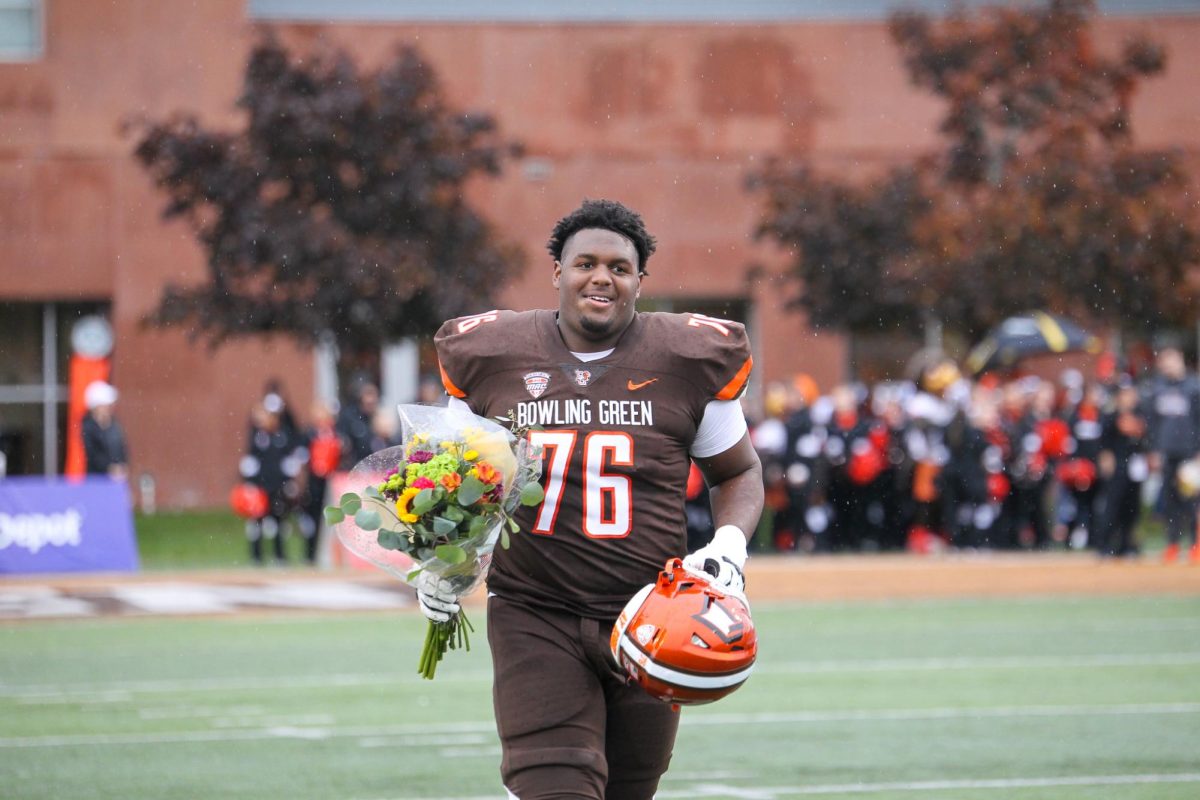By Kara Hull
Executive Editor
Lisa Kellogg says her daughter Krista looks like any other happy-go-lucky 8-year-old in passing.
But she’s not.
Though she sings almost constantly, laughs, plays hard and considers herself a whiz at the computer, Lisa says Krista’s “robotic” conversations and screaming when things don’t go her way can cause passersby to stare.
And when those who aren’t friends of the family learn that Krista has autism, it’s almost too much for them to handle, Lisa said. The Kellogg family, living almost 60 miles west of Bowling Green in Edgerton, Ohio, is one of five families with students enrolled in the satellite M.O.D.E.L. Community School for children with autism in Bryan, Ohio.
“People are so standoffish about autism,” Lisa said. “People can be judgmental. A lot of times society reacts to them like they have no control. They just don’t understand. I look at Krista and although she’s different, she’s so amazing in her own way.”
An invisible disability that still has scientists and doctors searching for concrete causes, autism is the fastest growing developmental disability in the country, medical experts say, and could become the most common disability within the next decade.
But even as the disorder becomes more prevalent, despite tougher standards dictating diagnosis, students with autism in its many forms fight against society’s stereotyped views of them everyday.
For University graduate student Bonnie Kelly, program director and teacher at Bryan’s M.O.D.E.L. school, this means that her students need to learn to debunk the “idiot servant” mentality by proving that with early intervention they can excel in life. Kelly was hired in the fall of 2003 to open the satellite charter school — a branch of a similar school in Maumee — after more than 14 years in the Chicago area as a behavior analyst working with people diagnosed with schizophrenia and autism.
“Autism is one of those taboo kind of things,” she said. “One of the biggest misconceptions is that [individuals with autism] can’t be productive members of society and they can.”
Though estimates vary, according to the Autism Society of America, as many as one out of every 250 babies born in the United States today will develop some form of autism. One of five known Pervasive Development Disorders, autism is a brain condition that usually appears by the age of 3 and causes difficulty with social abilities and communication skills.
For unknown reasons, Autism is four times more likely to occur in boys than girls, the ASA said.
The severity of the syndrome varies. Some individuals can’t talk without extensive training, while others who can talk lack the ability to interact socially with others and pick up voice inflections like sarcasm. Asperger’s Syndrome, one of the most common forms of autism today, is a mild type of the disorder where social skills don’t come easily.
BGSU students and autism
It’s this problem that causes the most heartache for BGSU students with the disorder.
“Academically, these students have needed very little help,” said Rob Cunningham, director of Disability Services. “It’s the social ineptness that is the problem.”
The University saw its first undergraduate student with Asperger’s last year and currently has four undergraduate students enrolled with the disorder, according to Cunningham, who’s been at BGSU since January of 1987. No graduate students with any form of autism have contacted his office, he said.
And they’re doing what they can to address the social needs of these students, Cunningham said.
“We’re not doing students any favors by tiptoeing around this,” he said. “You have to be flat out and honest with these students. We’re not therapists, but we do a great deal of coaching and role-playing on social situations.”
While his office often works with faculty to put accommodations in place as needed for these students in the classroom — like extended test-taking periods or taking tests in a quiet room because even the slightest distraction can be detrimental — the goal isn’t necessarily to always be an advocate for students, Cunningham said.
A balance is needed, he said, to truly help students with autism succeed in higher education — academically and in social circles.
“We’re right in the middle,” Cunningham said. “On one hand we have a responsibility to even the playing field for these students, but on the other hand faculty have a responsibility to assess the essential skills for all students. It can be a challenge with these students to not over-accommodate because the world is not barrier free and they need to learn coping skills.”
Causes: The great unknown
Though there is no known single cause for autism, experts suspect there may be a genetic link of autism with other developmental disabilities. Complications during pregnancy or delivery and ingesting harmful substances during pregnancy may also play a significant role in the occurrence of autism.
Environmental factors, like high levels of mercury in fish and pollution from coal-burning plants, are also being studied for correlation to autism, according to the Ohio Environmental Council.
When autism was officially recognized in the early 1950s, psychologists and doctors believed it developed in children from a lack of attention and love once women began to seek higher education and work outside of the home in larger numbers. Dubbed “refrigerator mothers,” these females were said to have lost their maternal desire to show affection.
Though this theory was officially discounted in the early 1970s, the impression of bad parenting in children with autism lives on, Defiance resident Julie Voll said. Her twin boys Jacob and Justin, 7, are enrolled at M.O.D.E.L.
Born with a type of autism that kept them quiet at 18 months when they should have been jabbering away, the boys threw terrible tantrums out of frustration as they grew up, often in the most public of places, she said.
“We would get the looks, we would get the stares, like we were bad parents,” she said. “You can’t discipline an autistic child like you can with other children.”
At M.O.D.E.L., Kelly and three aides work with mostly elementary- age students to teach things as basic as speaking, reading and learning to play with toys. With about two students per each professional, the school has a maximum limit of seven students and currently has three students on their waiting list.
According to Kelly, students with autism quickly lose their ability to fit in at school once others start to notice they’re “different.”
“These are the kids that in elementary school, they were cute, they used to look like a pet. But suddenly they become not cool anymore.”
And that’s when the whispering and staring begins, Lisa said, and a mother’s worry increases.
“It didn’t bother Krista though, thank goodness, because she’s happy in her own skin,” she said. “I hope she always will be.”
But sometimes accepting the disorder can be harder on the parents of students with autism than the students themselves, Voll said, of the day her twins went through a “grueling” daylong evaluation process and were diagnosed just before their third birthday. Equating the autistic diagnosis of her twins with the phases of dealing with a death, there were many occasions where she and her husband Joe were scared at what autism could mean for the twins.
“There were times where we couldn’t even talk about it,” she said. “I didn’t want to accept it. I didn’t want my children to be autistic.”
Ohio Autism Taskforce
Expensive treatments and increasing prevalence nationwide led Ohio Governor Bob Taft to establish the Ohio Autism Taskforce in June of 2003 to decide on action that needs to be taken to tackle autism in Ohio. The group– made up of 25 legislators, autism professionals and parents of children with autism — released a list of 43 recommendations late last month.
Among the recommendations are legislation forbidding health insurance companies from excluding coverage for those with autism, a regional system for delivering services, a public education campaign and more state funding for autism, including research into the causes and possible prevention methods for the disorder.
Four of the recommendations involving legislation have already been passed by the House of Representatives and await debate in the Ohio Senate, said Rep. Jon Peterson, a four-term Republican from Delaware and chair of the taskforce.
Though some of the recommendations may take years instead of days to implement, Peterson couldn’t be happier with the results of more than a year’s worth of work. Members of the taskforce will meet again this week, he said, to set up a game plan for attacking the rest of the recommendations whether they are legislative or administrative issues within the state.
“I’m very pleased with the ultimate set of recommendations,” Peterson said. “I think it’s the most comprehensive list I’ve seen.”
For Peterson, pushing the taskforce to its limits was a personal thing, he said. His daughter Hannah, 11, has autism. During part of their research, the group held eight regional forums and met with hundreds of citizens who also knew the frustrations of autism.
“It’s been a very difficult journey and one of the most wonderful parts about [the task force] was coming into contact with many other parents going through the same thing,” Peterson said. “I felt early on that it would be a mistake not to focus on this in my legislative career. And I think we’re making great progress here. I think people are starting to look to Ohio as a state where things are happening.”
Taskforce ties to BGSU
During the forum held in Toledo, Peterson and other taskforce members found not only an autism advocate in University faculty member Richard Wilson, but several recommendations that made it to the final version as well. Wilson, a professor in Intervention Services–part of the College of Education at BGSU– helped to put together a petition of more than 1,000 signatures asking for the creation of a separate autism teaching credential to be established in Ohio.
“I think most people in the field would agree that these are the toughest kids to work with,” he said. “And at least most of us believe rather strongly that you need specialized training to work with kids with autism.”
Though there’s gobs of professional development training, even online courses, available for teachers already in the workplace on autism, students graduating out of even the best education programs in the state don’t have the training to teach students with autism, Wilson said.
“These are worthwhile efforts, but they only occur after they get out and start working,” he said. “My reply is, is we know these teachers need those skills when they get out, why not prepare them beforehand?”
The recommendations, and what Wilson’s petition requests, calls for the Ohio Board of Regents to work with the Ohio Department of Education to establish a separate license for teachers wanting to work with students with autism. According to Wilson, only two or three universities in the state would need to develop the appropriate curriculum to produce the hundreds of teachers that are needed in this area.
And from where he stands, that’s a good investment.
“Then those teachers would be required to have that credential and then that would create not only the requirement, but the demand,” Wilson said. “And where there’s a demand, universities will respond to it.”
Awareness is key
A lack of awareness about autism is something that Cunningham sees now at BGSU and has plans to implement some speakers and programs on the subject, especially within the residence halls, next year, he said.
“What’s really needed and what I’d like to see us doing in the future is talking about who are our students?” he said. “It’s possible for students with autism to make it to higher education, but once they’re there it’s like ‘wow, who are these kids?’
Bad judgments by their peers can lead to tension in living communities and a challenging situation for all involved, said Michael Ginsburg, assistant dean in the Office of Student Life at BGSU. Ginsburg was involved with the decision to ban one student with Asperger’s living in Offenhauer Towers from the on-campus residence halls after several instances last semester with tantrums in the hallway, among other issues.
Some of the problems that arose could have been avoided with an increased awareness and education about autism for other students, he said.
“I think the challenge for students with autism or Asperger’s is much more how other people perceive them,” Ginsburg said. “Their ability to take social cues is much different than our own. It makes them very different because some people get uncomfortable around them, which is sad, in all honesty.”
That puts student disciplinary staff in a tough position, Ginsburg said, when the needs of the entire living community have to be considered.
“It’s very sad because it’s really a big challenge of balancing their rights and the rights of the community as well,” he said. “I think the unfortunate thing is the way the school systems are set up now, while I think it’s getting better, students that have disabilities are often segregated. For some students this may have been the first time they’re running into somebody with autism.”
As parents of children with autism, Voll even found her family knew very little about autism when Jacob and Justin were first diagnosed and see a lack of awareness in society today about the disorder.
“As my husband always says, ‘A lack of knowledge is ignorance.’ It wasn’t that we purposely made a choice to not know about autism, we just didn’t,” she said. “Joe and I had heard of it before, but only in our psychology class, and we had only heard the extreme–that someone with autism was set to just rock in a corner by themselves. We didn’t realize that autism was an entire spectrum.”
Anything that can be done to increase autism awareness is needed to help people prepare for the future, Kellogg said.
“We need people to be more accepting and more embracing for these people in the community because we’re going to have a lot of them,” she said.
And hopefully, Kellogg said, with more awareness and research into the disorder, Krista can lead a full life, even tackling her social struggles head on.
“I’m just a mom,” she said.
“I just want my baby to be happy. By the grace of God maybe she can live a pretty typical life someday.”

















